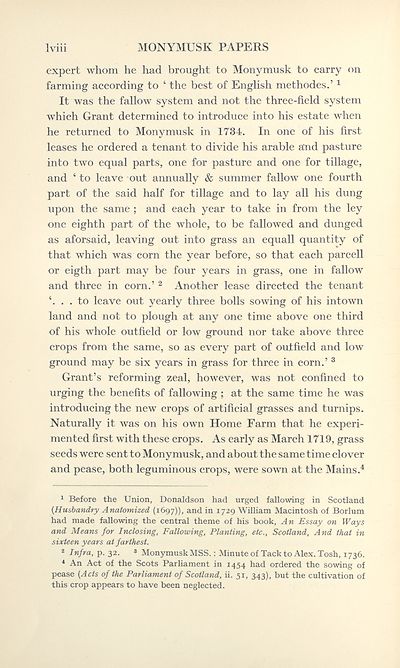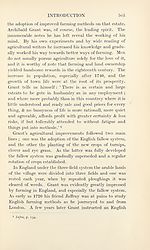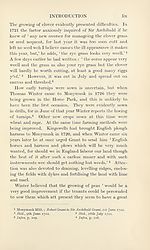Series 3 > Selections from the Monymusk Papers, 1713-1775
(63) Page lviii
Download files
Complete book:
Individual page:
Thumbnail gallery: Grid view | List view

Iviii
MONYMUSK PAPERS
expert whom he had brought to Monymusk to carry on
farming according to ‘ the best of English methodes.’1
It was the fallow system and not the three-field system
which Grant determined to introduce into his estate when
he returned to Monymusk in 1734. In one of his first
leases he ordered a tenant to divide his arable and pasture
into two equal parts, one for pasture and one for tillage,
and ‘ to leave out annually & summer fallow one fourth
part of the said half for tillage and to lay all his dung
upon the same ; and each year to take in from the ley
one eighth part of the whole, to be fallowed and dunged
as aforsaid, leaving out into grass an equall quantity of
that which was corn the year before, so that each parcell
or eigth part may be four years in grass, one in fallow
and three in corn.’ 2 Another lease directed the tenant
\ . .to leave out yearly three bolls sowing of his intown
land and not to plough at any one time above one third
of his whole outfield or low ground nor take above three
crops from the same, so as every part of outfield and low
ground may be six years in grass for three in corn.’ 3
Grant’s reforming zeal, however, was not confined to
urging the benefits of fallowing ; at the same time he was
introducing the new crops of artificial grasses and turnips.
Naturally it was on his own Home Farm that he experi¬
mented first with these crops. As early as March 1719, grass
seeds were sent to Monymusk, and about the same time clover
and pease, both leguminous crops, were sown at the Mains.4
1 Before the Union, Donaldson had urged fallowing in Scotland
(Husbandry Anatomized (1697)), and in 1729 William Macintosh of Borlum
had made fallowing the central theme of his book. An Essay on Ways
and Means for Inclosing, Fallowing, Planting, etc., Scotland, And that in
sixteen years at farthest.
2 Infra, p. 32. 3 MonymuskMSS.: Minute of Tack to Alex. Tosh, 1736.
4 An Act of the Scots Parliament in 1454 had ordered the sowing of
pease (Acts of the Parliament of Scotland, ii. 51, 343), but the cultivation of
this crop appears to have been neglected.
MONYMUSK PAPERS
expert whom he had brought to Monymusk to carry on
farming according to ‘ the best of English methodes.’1
It was the fallow system and not the three-field system
which Grant determined to introduce into his estate when
he returned to Monymusk in 1734. In one of his first
leases he ordered a tenant to divide his arable and pasture
into two equal parts, one for pasture and one for tillage,
and ‘ to leave out annually & summer fallow one fourth
part of the said half for tillage and to lay all his dung
upon the same ; and each year to take in from the ley
one eighth part of the whole, to be fallowed and dunged
as aforsaid, leaving out into grass an equall quantity of
that which was corn the year before, so that each parcell
or eigth part may be four years in grass, one in fallow
and three in corn.’ 2 Another lease directed the tenant
\ . .to leave out yearly three bolls sowing of his intown
land and not to plough at any one time above one third
of his whole outfield or low ground nor take above three
crops from the same, so as every part of outfield and low
ground may be six years in grass for three in corn.’ 3
Grant’s reforming zeal, however, was not confined to
urging the benefits of fallowing ; at the same time he was
introducing the new crops of artificial grasses and turnips.
Naturally it was on his own Home Farm that he experi¬
mented first with these crops. As early as March 1719, grass
seeds were sent to Monymusk, and about the same time clover
and pease, both leguminous crops, were sown at the Mains.4
1 Before the Union, Donaldson had urged fallowing in Scotland
(Husbandry Anatomized (1697)), and in 1729 William Macintosh of Borlum
had made fallowing the central theme of his book. An Essay on Ways
and Means for Inclosing, Fallowing, Planting, etc., Scotland, And that in
sixteen years at farthest.
2 Infra, p. 32. 3 MonymuskMSS.: Minute of Tack to Alex. Tosh, 1736.
4 An Act of the Scots Parliament in 1454 had ordered the sowing of
pease (Acts of the Parliament of Scotland, ii. 51, 343), but the cultivation of
this crop appears to have been neglected.
Set display mode to:
![]() Universal Viewer |
Universal Viewer | ![]() Mirador |
Large image | Transcription
Mirador |
Large image | Transcription
Images and transcriptions on this page, including medium image downloads, may be used under the Creative Commons Attribution 4.0 International Licence unless otherwise stated. ![]()
| Scottish History Society volumes > Series 3 > Selections from the Monymusk Papers, 1713-1775 > (63) Page lviii |
|---|
| Permanent URL | https://digital.nls.uk/127719765 |
|---|
| Attribution and copyright: |
|
|---|
| Description | Over 180 volumes, published by the Scottish History Society, containing original sources on Scotland's history and people. With a wide range of subjects, the books collectively cover all periods from the 12th to 20th centuries, and reflect changing trends in Scottish history. Sources are accompanied by scholarly interpretation, references and bibliographies. Volumes are usually published annually, and more digitised volumes will be added as they become available. |
|---|


